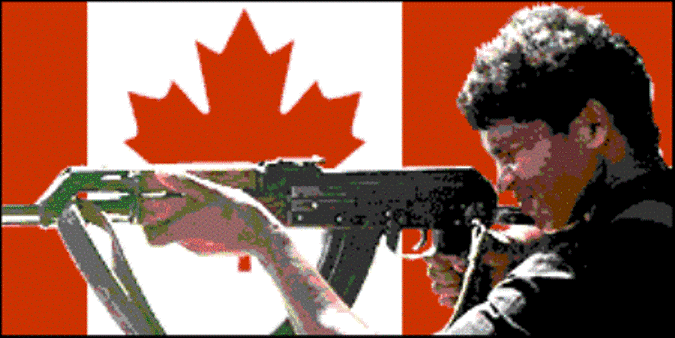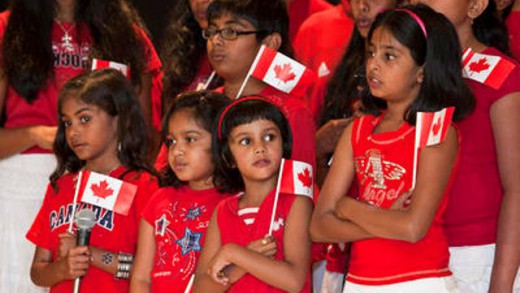January is Tamil Heritage Month. To mark this occasion, TamilCulture Magazine will publish a series of articles on Tamil history and heritage. Today’s article reflects on Tamil gang violence in Toronto in the 1990s.
Our past defines us. No matter how many achievements we make as a community or how many leaders we produce, we will always have to reconcile and balance this with the reputation that precedes us. Universally, Tamils are known for their struggle from a war-torn country where discrimination and communal violence brought about the Tamil diaspora. However, here in Toronto, our reputation is scarred by gang warfare, crime and fraudulent activities. We can’t escape our past. But as a community, we can try to understand how this happened if we have any hope of securing a positive future for the next generation.
Growing up as a teenager in the 90s, I recall a time whenever I turned on the news, images of Tamil gang violence would flood the screen. I remember wondering – how did machetes and drive-by shootings become synonymous with Tamil boys? What was the reason for the never-ending cycle of revenge that captured the lives of so many of our young men? Countless families escaped Sri Lanka with little more than their lives. So why did the violence follow us?
Recently, I had the opportunity to interview a group of Tamil men in their 30s who, due to proximity and circumstance, grew up in the midst of this situation. This experience opened my eyes to the misconceptions and preconceived notions that I brought to the table when I chose to explore this topic. I was surprised to learn that for most of the men I interviewed, their earliest memory encountering violence in the Toronto community had nothing to do with conflicts with other Tamils.
Interestingly, it all began with defending themselves from escalating acts of neighborhood bullying by older Caucasian boys. All of my sources had stories of being spit on and taunted for their accents and clothes, of being jumped for their lunch money and barraged with racist slurs. What resonated with me most was a particularly bloody incident in which a group of Tamil youth were run down on a field in Malvern and beaten with their own cricket bats by white teens when they were only thirteen years old. We never saw this reported on the evening news!

Tamil gangs were formed as a defense against racism. As first generation immigrants in the streets of Scarborough, the bonds of friendship and loyalty were forged from the simple need for protection.
However, this bond also set the foundation for gang activity to spiral down to new depths. The situation began to escalate as territories in the GTA were claimed by large groups of Tamils. A sense of belonging was established as gangs began to give themselves names. Gang members adopted nicknames based on their quirks or strengths. Gang entitlement settled in as firm boundary lines were set – the East side vs. the West.
It is hard to pinpoint when everything began to spiral out of control. However, most of the men agree that what started out as looking out for your “brother” escalated into groups of Tamils turning on each other for the most trivial reasons. Gang behavior was no longer just about self-defense and protecting one another. Ego, respect and reputation needed to be upheld at all costs wherever gang members went. Just looking at another man’s girlfriend the wrong way at a club could result in a shooting by the end of the night.
The guise of racism was no longer relevant as revenge became a driving force behind the escalating gang violence of the 90s. Every action taken against a gang had an equal or larger reaction – a proverbial twist to Newton’s law of motion. One source relayed how helpless he felt when two of his friends were gunned down two weeks apart. “When you are so far into it, going to the police is just not an option. Besides telling your friends to keep a low profile, what can you do but wait for something to happen as the cycle of revenge runs it course… over and over.”
The bond of loyalty among gang members is so strong that nothing is large enough to ask from a fellow “brother”. The consequences of these choices are the last thing to be considered when loyalty is at play. For most gang members, it doesn’t cross your mind that following your boys to the wrong place at the wrong time could end up jeopardizing the rest of your life. With the strength of this bond, all that matters is that your boys need your help. Saying no is not an option.
But consequences are where these stories end. Consequences ultimately catch up to anyone who engages in gang activity. They are also the reason the men that I spoke to agreed to share their life experiences with today’s generation of Tamil youth.
For the lucky few, warnings by the police were enough deterrence from engaging in further gang activity. Others had their Canadian citizenship revoked. Many were deported back to Sri Lanka. Large-scale deportation of prominent gang members – triggered by tips from the older members of the community – are credited with putting an end to the gang violence that was tearing up Toronto streets.
Today, there are former gang members who still live as fugitives from the law, running away from the life-altering choices that they made as teenagers. Often there is a meteoric fall, from a powerful, feared gang leader to a forgotten soul. Many never find peace as their past continues to haunt them. And while peripheral gang members often leave the gang due to the violence they witness or experience themselves, core gang members have a difficult transition due to their dependence on the gang for status and social support.

Growing into adulthood – through finding legitimate employment, getting married and becoming a father – is a key motivating factor to leave gang activity behind. Past grudges and gang loyalty become irrelevant when providing for one’s family becomes a top priority.
For every person I interviewed, a criminal record, no matter where it lies on the sliding scale of gravity, has had a tremendous impact on their lives. It has created obstacles that have interfered with securing career goals and lifelong dreams. Almost every company performs a criminal record check before hiring. And even if you are lucky enough to procure the job of your dreams, your past mistakes will inevitably establish a glass ceiling for promotion. This means that even if you try to work your way up within the company, a criminal record has the potential of always standing in your way. Not to mention living with the constant fear of losing your job at a moment’s notice if the company decides to impose random criminal record checks.
What about the consequences for your family? When you link your life to someone else through marriage and children, your mistakes are no longer solely yours to bear. Your spouse and children are also affected when a criminal background check is extended to include family. Is this really the price anyone is willing to pay to uphold loyalty to a gang? Breaking the law as a teenager creates a shadow that will stalk you quietly for the rest of your life. It has the potential to thwart your goals as well as the ambitions of those you love.
The evolution of our community has provided Tamil-Canadian youth today with multiple opportunities to get involved and stay out of trouble. “In the 90s, Tamil guys spent most of their time hanging out and drinking in parks in large groups. Boredom breeds opportunities for kids to find trouble.” Since teenage boys are known to be competitive by nature, Tamil sports organizations such as the Toronto Tamil Basketball, Volleyball and Softball leagues allow Tamil youth – male and female alike – to compete in a healthy and productive way.
All of the teams in the TTBA are named after different regions of the GTA. However, players on each team are drafted and chosen according to their talent, not where they are from. This effectively teaches them to forget about territorial loyalty and focus on working as a team to achieve a common goal – winning. If we continue to guide our youth to spend their time engaging in positive pursuits, we have a chance of stopping senseless acts of violence and crime from re-emerging.

It is now 2013 and we have made tremendous progress as a community. We have our own media outlets, sports leagues, numerous thriving small businesses and charitable organizations, a growing cohort of young professionals and even a young female Member of Parliament.
The temptation is there to solely focus on the present and set goals to move forward as a community – to sweep these lessons under the rug and pretend that the gang violence of the 90s never happened. But it did happen, and it has affected the reputation of the Tamil community in Toronto. If we choose to ignore the past, how will we ever learn from it to ensure that the cycle of violence does not repeat itself?
And to the men who were brave enough to open up their lives – as someone who works with youth on a daily basis, I believe that troubled teenagers who find themselves stepping in your footprints will learn from your experiences. I hope they will think twice about the long-term consequences of each choice they make, irrespective of gang loyalty. Thank you for educating me and giving me the chance to share your truth, one story at a time.
“The past is built from our experiences. Experience produces knowledge. Knowledge must be passed down so that we do not repeat the mistakes of our past.”

 Niluja Albert
Niluja Albert









